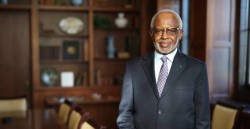
Chancellor Nicholas S. Zeppos announced the appointment of the university’s first vice chancellor for equity, diversity and inclusion and chief diversity officer, George C. Hill, on Dec. 1, 2015. Hill, who oversees the Office for Equity, Diversity and Inclusion, has, with his team, attained considerable progress and achievement since his appointment.
Hill is committed to engaging with diverse groups throughout the university, eliminating systemic barriers, and strongly advocating for inclusive excellence as he and his team work collaboratively with university stakeholders to set goals and ensure accountability.
“The past year has been incredibly productive and enlightening for me and for everyone involved. Our commitment to advancing equity, diversity and inclusion stands among our highest priorities, and we’ve created an environment where we are holding critical conversations related to this vital goal,” Zeppos said. “Now it’s incumbent on each member of the Vanderbilt community to become engaged and get involved. [lquote]We must be intentional in our efforts. To achieve a truly open, diverse and inclusive campus, we must dedicate ourselves to lasting, systemic changes and to cultivating a community that recognizes and respects all.”[/lquote]
The EDI office will be launching educational and training opportunities centered on unconscious bias for Vanderbilt faculty, staff and students in the coming months. The campuswide initiative stems from recommendations from the Chancellor’s Committee on Diversity, Inclusion and Community report, and it was identified as a top priority during the chancellor’s retreat in August 2016, which involved all the vice chancellors. The follow-up retreat is scheduled for January 2017, for which the chancellor has challenged leaders to identify measurable action steps on key initiatives and lead in their accomplishment.
Under Hill’s leadership, the office developed a student advisory board; a vice chancellor’s advisory council, which includes a representative from each school; and continues to hold listening sessions across the university for faculty, staff and students. Additionally, the office published the initial Community Profile, a compilation of data about Vanderbilt’s minority faculty, staff and students, which was prepared in collaboration with the Office of the Provost.
“Many of our initiatives came about through feedback from faculty, staff and students; responses from the faculty climate survey; the Chancellor’s Diversity, Inclusion and Community Report; and through the initiation of inclusive excellence as the principle on which our equity, diversity and inclusion initiatives are based,” Hill says. A record of some of the past year’s accomplishments can be found on the EDI website.
Recent communication initiatives include the launch of EDI Connect, a monthly newsletter which evolved from the Equity, Diversity and Inclusion Matter newsletter, iNCLUSIVE, a biweekly email consisting of diverse news and events campuswide.
“The purpose of these communications is to publicize progress in areas related to EDI at Vanderbilt and to involve faculty, staff and students in advocating for inclusive excellence,” Hill says. “[rquote]We strongly believe in the strategic intentional and affirmative integration of diversity efforts into the core aspects of Vanderbilt[/rquote], including decision-making, academic priorities, quality improvement initiatives, and day-to-day operations.”
Looking ahead, Hill has outlined key areas where Vanderbilt University can make additional progress in terms of implementing equity, diversity and inclusion in all its initiatives. He notes that these will be priorities of the Office for EDI in the upcoming year:
- Lead unconscious bias training and education at Vanderbilt University;
- Actively encourage, reward and support inclusive excellence in our colleges and schools intentionally and throughout Vanderbilt;
- Proactively bring together students, faculty and staff to conduct discussions across cultures, ideologies and perspectives within Vanderbilt;
- Recognize the strengths and challenges within our organization, and work with our colleagues to develop EDI plans and mission statements with measurable EDI goals;
- Partner with the provost to establish academic partnerships with other institutions to enhance the success of the goals of Vanderbilt University; and
- Ensure a data-driven decision-making process for equity, diversity and inclusion.
“As I reflect on our accomplishments together, I am encouraged by the work that has been done during the past year and excited about the collaborative programming and initiatives we will be launching in the coming year,” Hill says. “We will continue to nurture a community of inclusive excellence by organizing discussions across cultures, perspectives, and different points of view. We can only be excellent if we are intentionally inclusive.”
Contact:
Renuka Christoph
Office for Equity, Diversity and Inclusion
(615) 343-2125